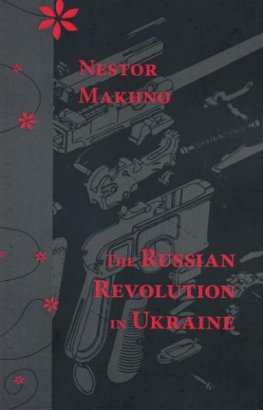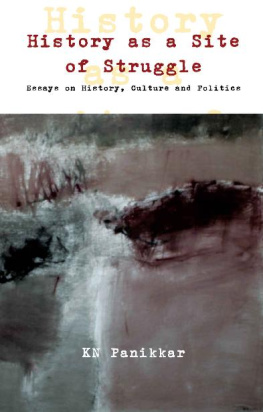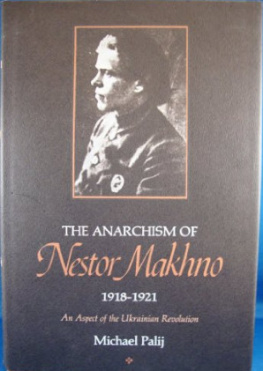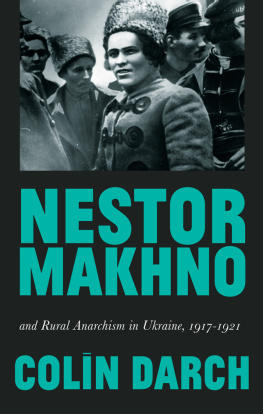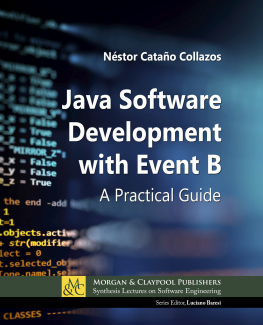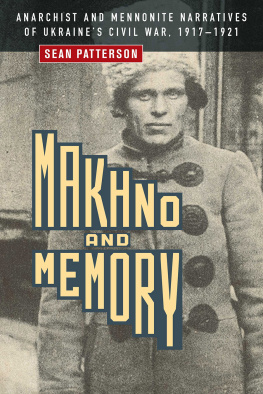Nestor Makhno - The Struggle Against the State and Other Essays
Here you can read online Nestor Makhno - The Struggle Against the State and Other Essays full text of the book (entire story) in english for free. Download pdf and epub, get meaning, cover and reviews about this ebook. publisher: Text::Muse, genre: Politics. Description of the work, (preface) as well as reviews are available. Best literature library LitArk.com created for fans of good reading and offers a wide selection of genres:
Romance novel
Science fiction
Adventure
Detective
Science
History
Home and family
Prose
Art
Politics
Computer
Non-fiction
Religion
Business
Children
Humor
Choose a favorite category and find really read worthwhile books. Enjoy immersion in the world of imagination, feel the emotions of the characters or learn something new for yourself, make an fascinating discovery.

- Book:The Struggle Against the State and Other Essays
- Author:
- Publisher:Text::Muse
- Genre:
- Rating:3 / 5
- Favourites:Add to favourites
- Your mark:
- 60
- 1
- 2
- 3
- 4
- 5
The Struggle Against the State and Other Essays: summary, description and annotation
We offer to read an annotation, description, summary or preface (depends on what the author of the book "The Struggle Against the State and Other Essays" wrote himself). If you haven't found the necessary information about the book — write in the comments, we will try to find it.
The Struggle Against the State and Other Essays — read online for free the complete book (whole text) full work
Below is the text of the book, divided by pages. System saving the place of the last page read, allows you to conveniently read the book "The Struggle Against the State and Other Essays" online for free, without having to search again every time where you left off. Put a bookmark, and you can go to the page where you finished reading at any time.
Font size:
Interval:
Bookmark:
edited by Alexandre Sirda, translated by Paul Sharkey, published by AK Press in 1996
Retrieved on March 12th, 2009 from www.spunk.org
The month of October 1917 is a great historical watershed in the Russian revolution. That watershed consists of the awakening of the toilers of town and country to their right to seize control of their own lives and their social and economic inheritance; the cultivation of the soil, the housing, the factories, the mines, transportation, and lastly the education which had hitherto been used to strip our ancestors of all these assets.
However, as we see it, it would be wide of the mark if we were to see all of the content of the Russian revolution encapsulated in October: in fact, the Russian revolution was hatched over the preceding months, a period during which the peasants in the countryside and the workers in the towns grasped the essential point. Indeed, the revolution of February 1917 came to be a symbol for the toilers of their economic and political liberation. However, they quickly noticed that the February revolution as it evolved adopted the degenerated format characteristic of the liberal bourgeoisie, and, as such, proved incapable of embarking upon a project of social action. Whereupon the toilers immediately cast off the restraints imposed by February and set about openly severing all their ties to its pseudo-revolutionary aspect and its objectives.
In the Ukraine, there were two facets to this activity. At the time, the urban proletariat, in view of the meagerness of the anarchists influence upon it on the one hand, and lack of information about the real political policies and domestic issues in the country on the other, reckoned that hoisting the Bolsheviks into power had become the most pressing necessity of the battle that had been joined for the pursuance of the revolution, if the coalition of Right Social Revolutionaries with the bourgeoisie was to be ousted.
Meanwhile, in the countryside, and especially in the Zaporozhe area of the Ukraine, where the autocracy had never quite managed to extirpate the spirit of freedom, the toiling revolutionary peasantry took it as its most over-riding and most basic duty to resort to direct revolutionary action in order to rid themselves as quickly as possible of the pomeshchiks and kulaks, being persuaded that this liberation would speed their victory against the socialist-bourgeois coalition.
This is the reason why the Ukrainian peasants went on the offensive, seizing the bourgeoisies weaponry (particularly at the time of putschist General Kornilovs march on Petrograd in August 1917) and then refusing to pay the second annual installment of land levies to the big landlords and kulaks. (The agents of the coalition tried in fact to wrest the land from the peasants, in order to hold it for the estate-owners, allegedly in deference to the governments adherence to the status quo pending the convening of the Constituent Assembly which would decide on the matter).
The peasants then got up and seized the estates and livestock of the pomeshchiks, kulaks, monasteries and State holdings: in so doing, they always set up local committees to manage these assets, with an eye to sharing them out among the various villages and communes.
An instinctive anarchism clearly illumined all the plans of the Ukraines toiling peasantry, which gave vent to an undisguised hatred of all State authority, a feeling accompanied by a plain ambition to liberate themselves. The latter, indeed, is very strong in the peasants: in essence it boils down to, first, getting rid of the bourgeois authorities like the gendarmerie, the magistrates sent out by the central authorities, etc. This was put into practice in many regions in the Ukraine. There are examples aplenty of the way in which the peasants in the provinces of Ekaterinoslav, Kherson, Poltava, Kharkov and part of Tavripol drove the gendarmerie out of their villages, or even stripped it of the right to make arrests without the say-so of the peasant committees and village assemblies. The gendarmes wound up as simply the bearers of the decisions these made. It was not long before the magistrates were reduced to like business.
The peasants themselves sat in judgment of all offenses and disputes at village assemblies or at special meetings, thereby denying all jurisdictional rights to the magistrates appointed by the central authorities. These magistrates sometimes fell so far from grace that they were often forced to flee or go into hiding.
Such an approach by the peasants to their individual and social rights naturally inclined them to fear lest the slogan All power to the soviets turn into a State power: these fears were perhaps less plainly evident among the urban proletariat, which was more under the sway of the social democrats and Bolsheviks.
To the peasants, the power of local soviets meant the conversion of those bodies into autonomous territorial units, on the basis of the revolutionary association and socio-economic self-direction of the toilers with an eye to the construction of a new society. Placing that sort of construction upon that slogan, the peasants applied it literally, expanded upon it and defended it against the trespasses of the Right SRs, Cadets (liberals) and the monarchist counter-revolutionaries.
Thus October had not yet happened when the peasants jumped the gun by refusing in many regions to pay the farm rents to the pomeshchiks and kulaks, then, having collectively seized the latters land and livestock, despatching delegates to the urban proletariat to come to some arrangement with it regarding the seizure of the factories and firms, the aim being to establish fraternal connections and, jointly, build the new, free society of toilers.
At this point, the practical implementation of the ideas of Great October had not yet been espoused by those who would later subscribe to it, the Bolsheviks and the Left SRs: it was even harshly criticized by their groups, organizations and central committees. On the other hand, as far as the Ukrainian peasants were concerned, Great October, and especially the status it was afforded in political chronology, looked very much like a chapter they had long since moved on from.
During the events in October, the proletariat of Petrograd, Moscow and other large cities, as well as the soldiers and the peasants adjacent to the towns, under the influence of anarchists, Bolsheviks and Left SRs, merely regularized and gave more precise political expression to that for which the revolutionary peasantry of many areas of the Ukraine had begun to struggle actively as early as the month of August 1917, and that in highly favorable conditions, enjoying, as they had, the backing of the urban proletariat.
The repercussions of the proletariats version of October reached the Ukraine a month and a half later. The intent behind it was evident at first from the appeals from the delegates from the soviets and parties, then from the decrees of the Soviet of Peoples Commissars, about which the Ukrainian peasants were diffident, having had no part in their appointments.
It was then that groups of Red Guards showed up in the Ukraine, coming largely from Russia, and attacking the towns and communications centers controlled by the Cossacks of the Ukrainian Central Rada. The latter was so infected by chauvinism that it found it impossible to understand that of the laboring population of the country could relate to their brethren from Russia, nor, above all, appreciate the revolutionary spirit at large among the toiling population which stood ready to fight for its social and political independence.
In offering this analysis of Great October on this, the occasion of its tenth anniversary, we ought to stress that what we accomplished in the Ukraine was perfectly in tune, in late 1917, with the actions of the revolutionary workers in Petrograd, Moscow and other great cities in Russia.
Font size:
Interval:
Bookmark:
Similar books «The Struggle Against the State and Other Essays»
Look at similar books to The Struggle Against the State and Other Essays. We have selected literature similar in name and meaning in the hope of providing readers with more options to find new, interesting, not yet read works.
Discussion, reviews of the book The Struggle Against the State and Other Essays and just readers' own opinions. Leave your comments, write what you think about the work, its meaning or the main characters. Specify what exactly you liked and what you didn't like, and why you think so.

